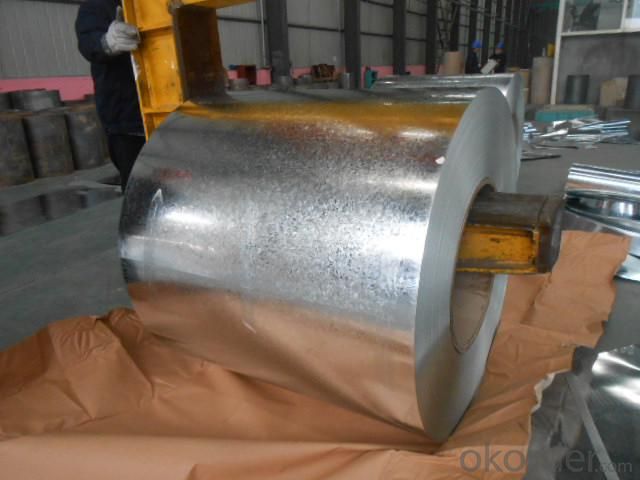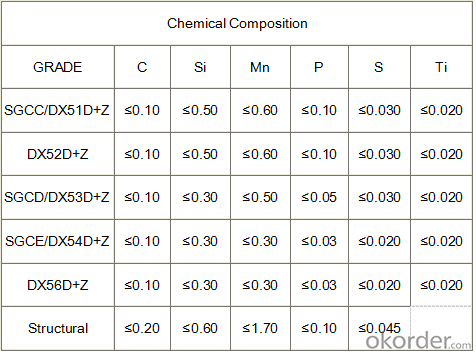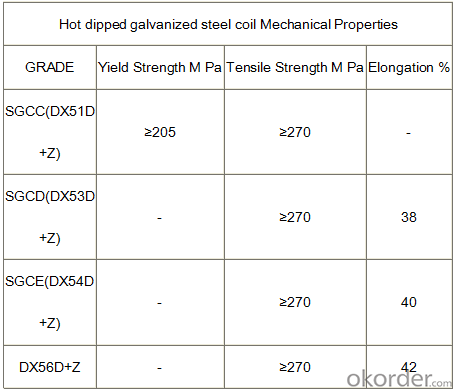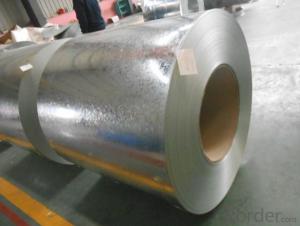Galvanized Steel Sheet in Ciols with Prime Quality Best Seller
- Loading Port:
- Tianjin
- Payment Terms:
- TT OR LC
- Min Order Qty:
- 50 m.t.
- Supply Capability:
- 5000 m.t./month
OKorder Service Pledge
OKorder Financial Service
You Might Also Like
1.Structure of Galvalume/Galvanized Steel Coil Description:
Hot-dip galvanized steel coils are available with a pure zinc coating through the hot-dip galvanizing process. It offers the economy, strength and formability of steel combined with the corrosion resistance of zinc. The hot-dip process is the process by which steel gets coated in layers of zinc to protect against rust. It is especially useful for countless outdoor and industrial applications.
2.Main Features of the Galvalume/Galvanized Steel Coil:
• Base material for countless outdoor and industrial applications
• High corrosion resistance
• High strength
• Good formability
• Rust- proof ability
• Good visual effect
3.Galvanized /Galvalume Steel Coil Images

4.Galvanized /Galvalume Steel Coil Specification
Operate Standard: ASTM A653M-04/JIS G3302/DIN EN10143/GBT 2518-2008
Grade : SGCD,SGCH, Q195,DX51D
Zinc coating :40-180g( as required)
Width:914-1250mm(914mm, 1215mm,1250mm,1000mm the most common)
Coil id:508mm/610mm
Coil weight: 4-10 MT(as required)
Surface: regular/mini/zero spangle, chromated, skin pass, dry etc.


5.FAQ of Galvanized/Galvalume Steel Coil
We have organized several common questions for our clients,may help you sincerely:
1.How to guarantee the quality of the products?
We have established the international advanced quality management system,every link from raw material to final product we have strict quality test;We resolutely put an end to unqualified products flowing into the market. At the same time, we will provide necessary follow-up service assurance.
2. What is the minimum order quantity ?
Our MOQ is 50mt for each size. And we will consider to give more discount if you make big order like 1000 tons and more. Further more, the more appropriate payment term your offer the better price we can provide.
3.How long can we receive the product after purchase?
Usually within thirty working days after receiving buyer’s advance payment or LC. We will arrange the factory manufacturing as soon as possible. The cargo readiness usually takes 15-25 days, but the shipment will depend on the vessel situation.
- Q:What are the pros and cons of non-stick and stainless steel pots and pans ?Thanks
- NEVER cook eggs in anything other than a nonstick pan. They stick real good! Though nonstick surface does wear off eventually and you have to get new ones..
- Q:How many pounds can steel lift?
- It depends on the type of steel and the geometry of the item.
- Q:How do steel coils perform in extreme weather conditions?
- Steel coils are highly durable and resistant to extreme weather conditions. They can withstand intense heat, freezing temperatures, heavy rain, and strong winds without losing their structural integrity or performance.
- Q:How do steel coils contribute to the energy storage industry?
- Steel coils play a vital role in the energy storage industry by serving as a key component in large-scale energy storage systems such as pumped hydro storage and compressed air energy storage. These coils are used in the construction of storage tanks and pressure vessels, which are essential for storing and releasing energy on demand. Additionally, steel coils are also utilized in the manufacturing of battery systems used in grid-scale energy storage applications, providing structural support and ensuring safety and reliability.
- Q:What is the difference between steel coils and steel sheets?
- Steel coils and steel sheets, although both forms of steel, exhibit distinct differences. Steel coils, which are long rolls of steel wound into a coil shape, are typically produced at a steel mill and serve as raw materials for further processing or manufacturing. Various industries, including automotive, construction, and appliance manufacturing, commonly utilize steel coils in the production of items such as pipes, tubes, and automotive parts. Conversely, steel sheets are flat pieces of steel that are typically derived from steel coils. These sheets come in different sizes and thicknesses, making them versatile for various applications. Construction projects, such as roofing, siding, and structural components, often employ steel sheets. Additionally, they are utilized in manufacturing processes like stamping, forming, and fabricating diverse products. One primary distinction between steel coils and steel sheets lies in their shape and form. Steel coils adopt a cylindrical, rolled form, whereas steel sheets possess a flat, rectangular structure. This dissimilarity in shape renders steel coils more suitable for continuous production processes, while steel sheets find application in scenarios that demand flat surfaces. Another variation pertains to the handling and transportation of these steel forms. Due to their large size and weight, steel coils necessitate specialized equipment like coil cars or cranes for transport and storage. Conversely, steel sheets can be conveniently stacked, transported, and stored using conventional methods. Lastly, the processing requirements for steel coils and steel sheets differ. Steel coils often undergo additional processing steps, such as slitting, cutting, or coating, to meet specific customer requirements. Conversely, steel sheets may require minimal processing before being utilized in their intended applications. In summary, steel coils and steel sheets exhibit variances in shape, handling, transportation, and processing requirements. Steel coils, in their rolled, cylindrical form, are utilized for further processing, while steel sheets, cut from coils, serve specific applications. Recognizing these distinctions is crucial when selecting the appropriate steel form for a particular project or manufacturing process.
- Q:How are steel coils inspected for surface finish variations?
- Steel coils are inspected for surface finish variations using visual examination, mechanical methods such as gauges and calipers, and non-destructive testing techniques like magnetic particle inspection or ultrasonic testing.
- Q:I am buying my boyfriend a steel guitar for our one year anniversary and I was curious what brand or company I should look into. I want something high quality yet traditional. Money is not really an issue but I don't exactly want to spend an arm and a leg either.Thank you in advance!
- Pedal steel or lap steel? Or do you perhaps mean a steel-STRING guitar, or a steel-bodied resonator guitar? Might help weed out irrelevant replies if you were to clarify.
- Q:I am a complete idiot when it comes to anything musical, so please forgive me if this is a stupid question. I bought my son his first guitar, acoustic and didnt realize until after I purchased it that it has steel strings. Can I have the strings changed from steel to nylon???
- If it's a Fender, you will need wire cutters to cut the brass barrel shape off the end to feed the string into the clamp. Otherwise on most guitars you just anchor the string barrel at the bridge end, feed the string along the neck and through the hole in the capston and turn the string capston by using the handle The surplus string can just be coiled up. I never had a string winder for years, ---bit of a gimmick --- --but does save time. A point worth noting if considering splashing out on a string winder is that some of them are equipped with a wire cutter as well. 2 Tools in one eh!!
- Q:how many persent of manganese in all types of carbon steel
- Not more than 1.65 % of manganese in carbon steel. *Carbon steel, also called plain carbon steel, is steel where the main alloying constituent is carbon. The American Iron and Steel Institute (AISI) defines carbon steel as: Steel is considered to be carbon steel when no minimum content is specified or required for chromium, cobalt, columbium, molybdenum, nickel, titanium, tungsten, vanadium or zirconium, or any other element to be added to obtain a desired alloying effect; when the specified minimum for copper does not exceed 0.40 percent; or when the maximum content specified for any of the following elements does not exceed the percentages noted: manganese 1.65, silicon 0.60, copper 0.60 *AISI 1040 is a carbon steel which is having a 0.60-0.90 % of manganese.
- Q:What is the role of steel coils in the supply chain?
- Steel coils play a crucial role in the supply chain, particularly in the manufacturing and construction industries. These coils, which are typically made from hot-rolled steel, serve as a primary raw material for a wide range of products, including automobiles, appliances, construction materials, and various other industrial goods. The supply chain for steel coils begins with the production of raw steel, which is then processed and shaped into coils at steel mills. These coils are subsequently transported to various manufacturing facilities where they are transformed into finished products. Throughout this process, steel coils act as an intermediary product that is easily transportable, stackable, and can be easily manipulated to fit different manufacturing requirements. One of the key advantages of using steel coils in the supply chain is their strength and durability. Steel is known for its high tensile strength, which enables it to withstand significant loads and pressures. This makes steel coils ideal for applications that require robust materials, such as structural components in buildings, heavy machinery, and vehicles. Moreover, steel coils are highly customizable, allowing manufacturers to tailor the dimensions and specifications of the coils to meet their specific needs. This flexibility ensures that the supply chain can efficiently deliver steel coils that align with the requirements of different industries and projects. In terms of logistics, steel coils are typically transported in large quantities using specialized equipment such as flatbed trucks, railcars, or even ships. Efficient logistics planning is essential to ensure on-time delivery and minimize transportation costs. Additionally, proper storage and handling are crucial to prevent damage to the coils during transit and storage. Overall, steel coils play an integral role in the supply chain by serving as a versatile raw material that can be shaped and transformed into various end products. Their strength, durability, and flexibility make them a vital component in industries that rely on high-quality steel, ultimately contributing to the overall economic growth and development of numerous sectors.
1. Manufacturer Overview |
|
|---|---|
| Location | |
| Year Established | |
| Annual Output Value | |
| Main Markets | |
| Company Certifications | |
2. Manufacturer Certificates |
|
|---|---|
| a) Certification Name | |
| Range | |
| Reference | |
| Validity Period | |
3. Manufacturer Capability |
|
|---|---|
| a)Trade Capacity | |
| Nearest Port | |
| Export Percentage | |
| No.of Employees in Trade Department | |
| Language Spoken: | |
| b)Factory Information | |
| Factory Size: | |
| No. of Production Lines | |
| Contract Manufacturing | |
| Product Price Range | |
Send your message to us
Galvanized Steel Sheet in Ciols with Prime Quality Best Seller
- Loading Port:
- Tianjin
- Payment Terms:
- TT OR LC
- Min Order Qty:
- 50 m.t.
- Supply Capability:
- 5000 m.t./month
OKorder Service Pledge
OKorder Financial Service
Similar products
New products
Hot products
Related keywords





























